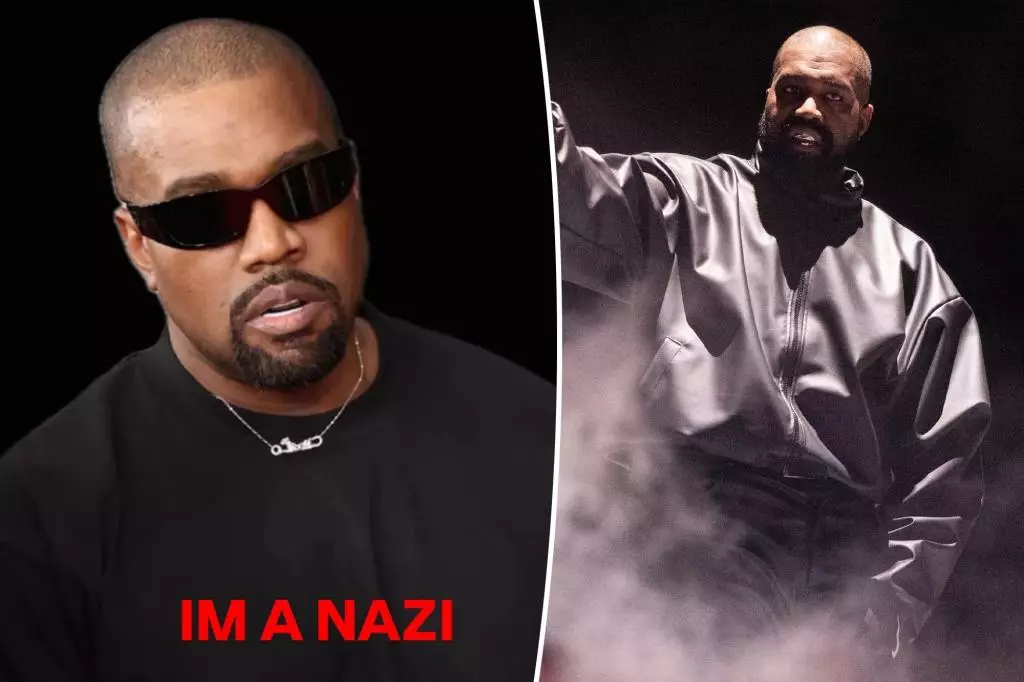In a startling move that raises profound questions about societal boundaries and artistic expression, Kanye West recently announced a casting call for his new project, a “hooligan choir” intended to accompany a track from his upcoming album, “Vultures.” However, his recruitment parameters sparked outrage and disbelief, laying bare a disturbing facet of his ideology. By specifying that participants must be all male with skin tones akin to Sean Combs or darker, and blatantly excluding individuals deemed “fat,” West not only reinforces a toxic narrative surrounding body image but also hints at an alarming exclusivity that feels eerily reminiscent of historical segregation.
West’s invitation for potential participants to either have a shaved head or be willing to shave demonstrates a concerning obsession with uniformity. Coupled with the outrageous condition that members must be comfortable donning swastikas, it becomes clear that this casting call is less about musical collaboration and more about crafting a provocative, controversial image that challenges societal norms and ignites debates over hate symbolism. The toxicity of these requirements cannot be underestimated; they are a troubling declaration of allegiance to an extremist ideology.
The Echoes of Antisemitism
Kanye’s descent into antisemitic rhetoric is not a new phenomenon; it has been festering since October 2022 when his divisive comments cost him lucrative brand partnerships, including the significant deal with Adidas. The former rap icon has oscillated between expressing remorse and doubling down on his hateful tirades. His recent behavior can be seen as not merely a call for artistic collaborators but a blatant act of defiance against any form of social accountability.
The internet has reacted with a mixture of shock and shame, as users voice their disbelief over how unapologetically West continues to propagate harmful ideologies. Such a trajectory poses serious questions about the responsibilities of social media platforms. While some users have directed their ire toward Elon Musk for allowing such content to proliferate on X (formerly Twitter), the broader implications touch on freedom of speech versus hate speech. Is there a tipping point where artistic freedom transforms into a direct threat to societal morals?
A Disturbing Pattern of Behavior
What seems to be a pattern emerges when one analyzes West’s behavior over the years. Initially voicing regret over his antisemitic remarks, his subsequent actions suggest a deliberate neglect of the pain those words have caused. It appears that his controversial stance has evolved into a reckless indulgence in provocateur behavior, as he defiantly declared love for Adolf Hitler and dismissed concerns with crude retorts that further alienate his supporters. This reveals a troubling disconnection from reality, where an artist, previously held in high regard, becomes a vessel for hate.
The recent activity on his Yeezy website, where he attempted to sell apparel adorned with swastikas, pushed boundaries further by showcasing a glaring disregard for the history of violence associated with such symbols. With Shopify shuttering the store in response, we are left to wonder: at what cost does the pursuit of artistic expression come? The ensuing backlash not only tarnished his reputation but also exposed significant gaps in our collective moral conscience.
Kanye West’s descent into darkness raises compelling dialogue about the intersections of celebrity culture, personal responsibility, and societal impact. In an age where voices wield unprecedented power, one must question whether artistic ambition can ever excuse the perpetuation of hate-filled ideologies that threaten to fracture the very fabric of our society.

